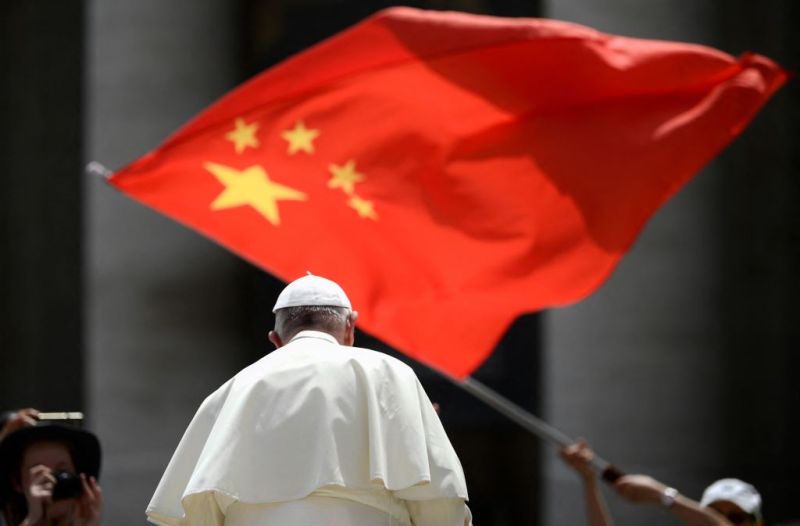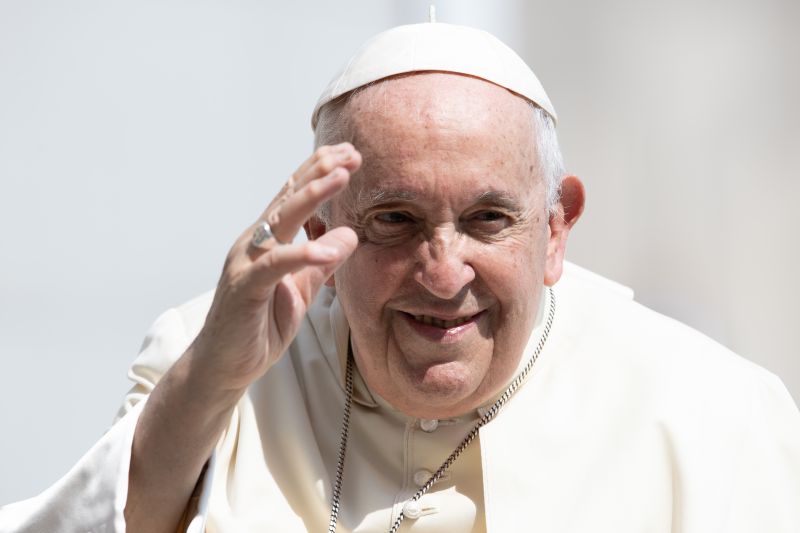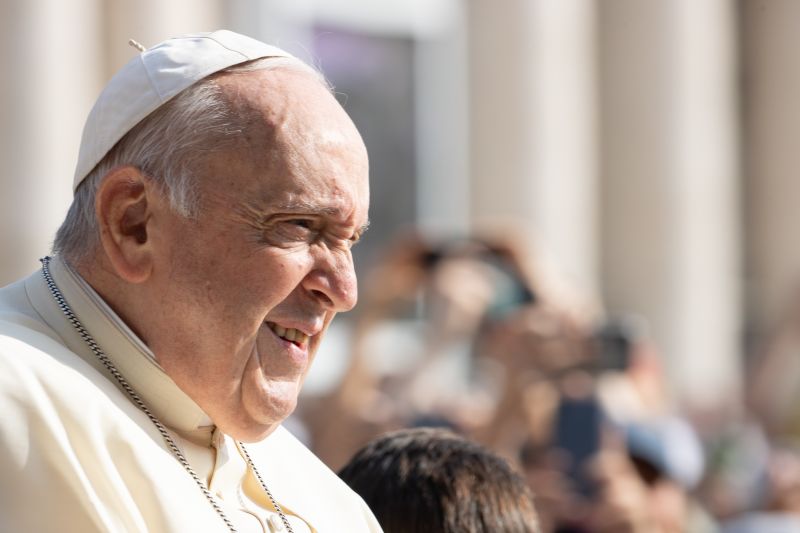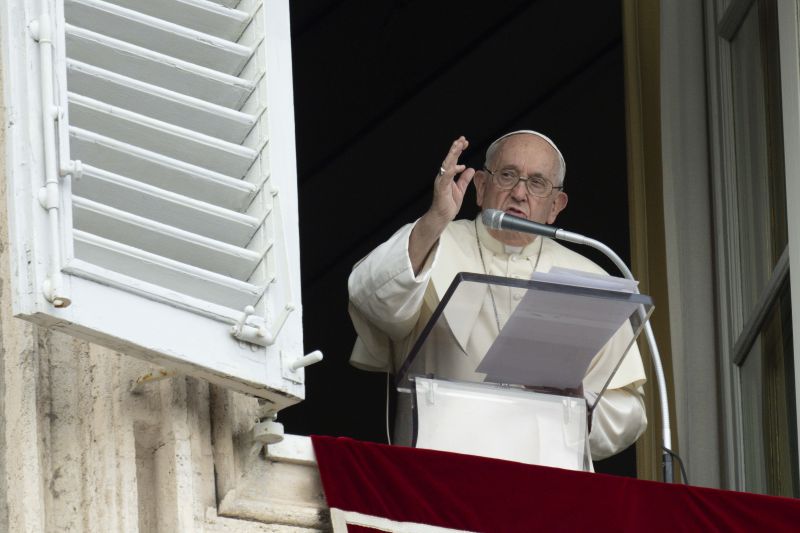 A worshipers waves the flag of China as Pope Francis leaves following the weekly general audience on June 12, 2019, at St. Peter’s square in the Vatican. / Photo by FILIPPO MONTEFORTE/AFP via Getty Images
A worshipers waves the flag of China as Pope Francis leaves following the weekly general audience on June 12, 2019, at St. Peter’s square in the Vatican. / Photo by FILIPPO MONTEFORTE/AFP via Getty Images
Rome Newsroom, Jul 15, 2023 / 06:30 am (CNA).
Pope Francis has decided to approve the appointment of the bishop of Shanghai who was previously installed by Chinese authorities without the Vatican’s approval.
Vatican Secretary of State Cardinal Pietro Parolin announced on Saturday that Pope Francis wanted to “remedy the canonical irregularity created in Shanghai, in view of the greater good of the diocese and the fruitful exercise of the bishop’s pastoral ministry.”
Parolin said that the pope’s “intention is fundamentally pastoral” and will allow the bishop to “work with greater serenity to promote evangelization and foster ecclesial communion.”
Bishop Joseph Shen Bin was installed in Shanghai in April in violation of the Holy See’s provisional agreement with Beijing on the appointment of bishops. It was the second unauthorized appointment by Chinese authorities in the past year.
Pope Francis formally confirmed Shen Bin for the Shanghai post on July 15. Parolin said that the Vatican intentionally made “the decision to take time before publicly commenting on the case” to evaluate the pastoral situation in Shanghai, which has been without a bishop for over a decade.
In an interview with Vatican News published with the announcement of the Chinese bishop’s appointment, Parolin underlined that it is “indispensable, that all episcopal appointments in China, including transfers, be made by consensus, as agreed, and keeping alive the spirit of dialogue” between the Holy See and China.
The Holy See first entered into a provisional two-year agreement with Beijing on the appointment of bishops in 2018, which was renewed in 2020 and again in 2022.
One month after the Holy See agreed to renew the deal last October, the Vatican said that Chinese authorities violated the terms stipulated in the agreement by installing Bishop John Peng Weizhao as an “auxiliary bishop of Jiangxi,” a diocese that is not recognized by the Vatican.
Parolin explained that the text of the provisional agreement has been kept confidential “because it has not yet been definitively approved.”
“It revolves around the fundamental principle of consensual decisions affecting bishops,” he said.
“We are, therefore, trying to clarify this point, in an open dialogue and in a respectful confrontation with the Chinese side.”
When asked what other topics need to be discussed in the Vatican’s dialogue with China, Parolin listed evangelization, the bishops’ conference, and the communication between Chinese bishops and the pope.
The cardinal called for a Chinese bishops’ conference with “statutes appropriate to its ecclesial nature and pastoral mission” and the establishment of regular communication between Chinese bishops and the pope.
“In fact, it must be said that too many suspicions slow down and hinder the work of evangelization: Chinese Catholics, even those defined as ‘underground,’ deserve trust, because they sincerely want to be loyal citizens and to be respected in their conscience and in their faith,” Parolin said.
Despite the repeated violations, Parolin added that the Holy See is “determined” to continue dialogue with China.
“Indeed, the dialogue between the Vatican side and the Chinese side remains open and I believe that it is a path that is in some way obligatory,” he said.
“In order to make it smoother and more fruitful, it seems to me that the opening of a stable liaison office of the Holy See in China would be extremely useful. I take the liberty of adding that, in my opinion, such a presence would not only favor dialogue with the civil authorities, but would also contribute to full reconciliation within the Chinese Church and its journey towards desirable normality.”
Bishop Joseph Shen Bin
Shen Bin, 53, was consecrated as a Catholic bishop in 2010 with the consent of both the pope and Chinese authorities, according to the Vatican. He served as bishop of the Diocese of Haimen until April 2023 when he was transferred to Shanghai “without the involvement of the Holy See.”
Since 2022, Shen Bin has been the president of a group called the Council of Chinese Bishops, a state-sanctioned bishops’ conference not recognized by the Vatican. He previously was the vice president of the Chinese Catholic Patriotic Association established by the Chinese Communist Party and under the control of the United Front Work Department.
One month after Shen Bin’s installation, officials from the Chinese People’s Political Consultative Conference (CPPCC) visited Shanghai to evaluate the progress of “Sinicization” in the diocese.
In his installation ceremony, the bishop said that he would, “continue to carry forward the fine tradition of patriotism and love of the Catholic Church in Shanghai, adhere to the principle of independence and self-government, adhere to the direction of my country’s Catholicism in China, and better promote the healthy inheritance of Shanghai Catholic evangelization.”
The Diocese of Shanghai
The Diocese of Shanghai is the largest Catholic diocese in the country and home to the Basilica of Our Lady Help of Christians, also known as the National Shrine of Our Lady of Sheshan. The shrine, consecrated in 1873, is considered the first Basilica of East Asia and is one of the main pilgrim sites on the Mainland for Catholics.
The diocese was the hub of Catholic counter-revolutionary activity in the 1950s (and the city where the CCP was founded in 1921). Following Mao’s victory in 1949 Bishop Ignatius Kung Pin-Mei helped establish the apparatus of Catholic resistance that would become the underground Catholic church. On the night of September 8, 1955, Bishop Kung, along with several hundred other clergy and lay Catholics, were arrested for their defiance of the regime and their refusal to renounce union with the pope. By the end of the month, some 1,2000 Shanghai Catholics were arrested. Kung was imprisoned for a total of 30 years before coming to the United States in 1988.
The Diocese of Shanghai has been functionally vacant since the death of Bishop Aloysius Jin Luxian in 2013. Jin had been imprisoned and sent to reeducation camps, only to be fully freed in 1982. He was made bishop of Shanghai in 1985, during Deng Xiaoping’s period of opening up, but it wasn’t until 2005 that he was recognized by the Holy See. He played a critical role in reestablishing the Sheshan Seminary and in rebuilding the local Church in Shanghai.
Bishop Joseph Xing Wenzhi, who was ordained with papal approval and government approval, was made auxiliary bishop of Shanghai in 2005 and disappeared from the public in 2011.
Auxiliary Bishop Thaddeus Ma Daqin, Xing’s successor, denounced the CCPA during his ordination mass on July 7, 2012; later that night he was put under house arrest in the Sheshan Seminary, where he remains to this day.
[…]






